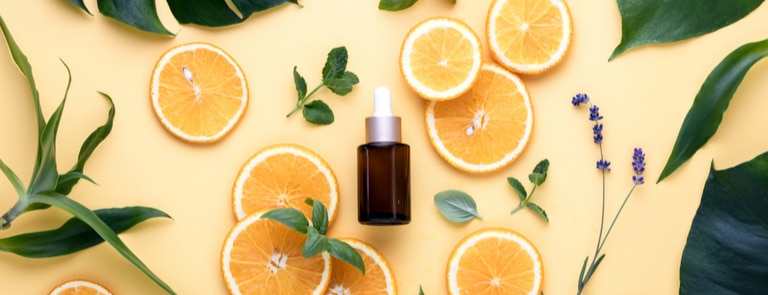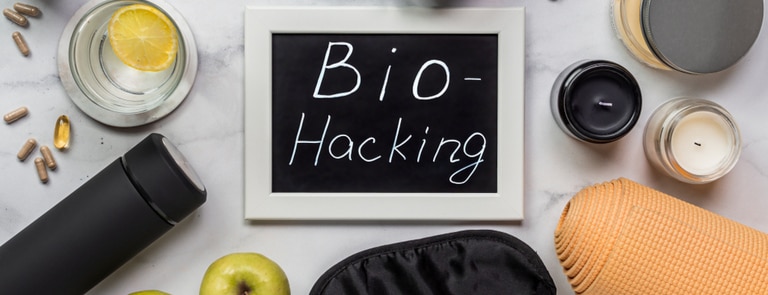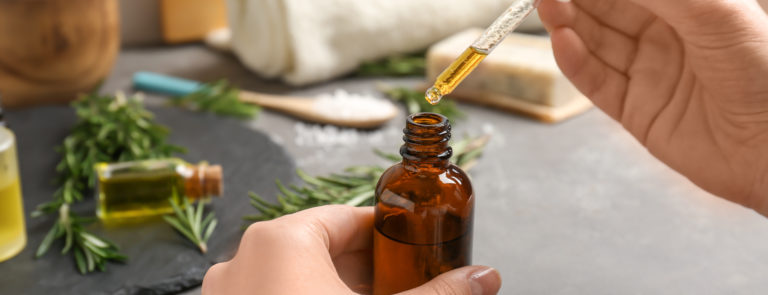15% off €35 OR 20% off €45
8 science backed orange oil benefits and uses

Most of us have all enjoyed one or more juicy oranges; to quench our thirst on a hot, sunny day or at half-time for a refreshing boost. And, of course, there’s orange juice, which is a breakfast drink staple for many people.
But what about orange essential oil, have you ever used it or know of somebody who does? There are lots of advantages to gently inhaling orange oil or applying it to your skin (4-6 drops with 20ml of blending oil), which are just two of the ways it can be used. You’ll also be surprised at just how many things it can be used for in your everyday routines (hint: your surfaces will smell delicious!)
There’s a lot to know about essential orange oil, keep reading to learn all about it.
What is orange oil?
Orange oil, or orange essential oil, is a citrus oil that’s extracted from the fruit of sweet orange trees. These trees, which are native to China, are easy to spot due to the combination of dark green leaves, white flowers and, of course, bright orange fruit.1
Sweet orange essential oil is extracted from the oranges and rind that grow on the Citrus Sinensis species of orange tree. But there are several other types of orange oil available too. They include bitter orange essential oil, which comes from the rind of the fruit of Citrus Aurantium trees.
Other types of orange essential oil include neroli oil (from the flowers of Citrus Aurantium), petitgrain oil (from the leaves of Citrus Aurantium), mandarin oil (from Citrus Reticulata Blanco), and bergamot oil (from Citrus Bergamia Risso and Piot).2
Summary: Orange essential oil is just that, oil from oranges. There are several different orange oils, depending on the type of orange tree they’ve been sourced from, as well as the part of the tree. Sweet orange oil, bitter orange essential oil and mandarin oil are just a few of the different types of orange oil that exist.
What is in orange oil?
Orange oil is just that, orange oil. More specifically, it’s extracted from either the fruit or the rind, or both, of oranges using a method called cold pressing.
This particular pressing process involves using pressure to gently squeeze every drop of oil from the orange fruit or rind. Some products also contain the flowers and leaves from orange plants too.
As with all essential oils, some orange essential oils contain nothing but pure orange oil, such as Miaroma’s 100% pure orange oil. Given the undiluted nature of these products, they need to be blended with a carrier oil (orange oil blends well with frankincense, citronella and ginger) or combined with a cream to avoid skin irritations and reactions. It’s also possible to buy products that contain orange oil that’s been combined with other complementary oils, such as Tisserand’s Total De-Stress Diffuser Oil, which also contains geranium and nutmeg.
Summary: Most orange oils contain oil that’s been taken from the fruit, rind, flowers or leaves of orange plants. Some orange oils contain 100% pure orange oil while others can contain a combination of ingredients, including orange oil.
Is orange oil good for skin?
It’s not uncommon for certain essential oils to have beneficial properties because of their ability to combat the appearance of redness in the skin. As far as orange oil’s concerned, sweet orange essential oil in particular has been proven to have strong cleansing capabilities.3 Other citrus oils with this ability include grapefruit and bergamot.4
A 2014 study in Complementary Therapies in Medicine concluded that orange oil’s antimicrobial effects may be beneficial for people with blemishes. The study focused on 28 volunteers, who were divided into four groups. Each of these groups were given a different topical gel to apply to their skin over an eight-week period. The study concluded that all four gels, one of which included a blend of sweet orange essential oil and basil, reduced blemish symptoms by 43 to 75%.
Summary
Sweet orange essential oil has proven to have strong cleansing capabilities.
What is orange oil used for?
Believe it not, orange oil is used in so many ways by people to add some orangey zing to their everyday routines, simply by using a drop or two of this particular oil. For instance, you can use it for:
1. Cleaning
Yes, that’s right, other than smelling amazing, orange oil makes a pretty impressive household cleaner. In fact, it’s possible to clean your entire home with orange oil!6
To wipe down surfaces: Add 3 drops of orange oil to a damp cloth and wipe down surfaces that attract germs.
To create an all-purpose spray: Combine 10 drops of orange oil with 10 drops of lemon essential oil in a large spray bottle. Fill it up with white vinegar or distilled water, and then spray generously on surfaces or fabrics to help with cleaning,
2. Bathing
We all know how wonderfully uplifting oranges smell, so imagine bathing in that citrusy fragrance?6
For the perfect bath soak: Add 5 drops of orange oil to warm bath water and soak for around 15 to 20 minutes.
3. Massaging
Orange oil has long been used in aromatherapy due to its relaxing properties and ability to potentially alleviate muscle and joint discomfort when applied to the skin.7
For a relaxing massage: Combine 3 drops of orange oil with 1oz of carrier oil. Apply the oil in a gentle circular motion. Massage into skin for 5 to 10 minutes. (For more on carrier oils read, ‘What is carrier oil?’)
4. Moisturising
It’s more straightforward than you may think to make your own orange essential oil cream full of powerful antioxidants to help with the negative effects of free radicals, thanks to orange oil’s natural qualities.8
To make your own orange oil moisturiser: Combine 1 cup of coconut oil, 1 cup of shea butter and 1 cup of cocoa butter in a large glass jar. Add 30 drops of grapefruit seed oil and wild orange oil. Place the glass jar in a medium-sized pan filled with water. Bring the water to the boil. Once the ingredients in the glass jar have all melted, mix the liquid well. Remove from the heat and leave to cool down to room temperature. Use in the morning and evening to promote skin appearance
Summary
Orange oil doesn’t just smell delicious, it can be used for household cleaning, as well as to relax and moisturise with.
What are the benefits of using essential orange oil?
Orange essential oil has been associated with several health benefits, particularly when it comes to using it for aromatherapy.
Some aromatherapy practitioners believe inhaling it or absorbing it through the skin transmits messages to the region of our brain that processes our emotions and regulates the autonomic nervous system. This system is responsible for how fast our heart beats and regulating blood pressure, as well as how little/much we sweat and how our gut functions.
When used in aromatherapy, it’s believed orange essential oil may help with one or more of the following:
- Colds and flu
- Depression
- Constipation
- Stress
3 other benefits of using orange oil
1. Easing anxiety
Breathing in sweet orange essential oil may help ease anxiety, according to a 2012 study in the Journal of Alternative and Complementary Medicine. The study of 40 men looked at the effects of sweet orange essential oil when different concentrations (2.5, 5 and 10 drops) of it were inhaled.9
The research found that the men were exposed to orange essential oil, they had less anxiety, greater alertness, and a more positive mood than those who inhaled non-aromatic water.
2. Soothing blemish-prone skin
As mentioned a bit further up, some research has found a link between orange oil’s antimicrobial effects and helping with the symptoms of acne.10
The 2014 Complementary Therapies in Medicine study compared orange oil with basil oil and their effects on the skin. The study found that sweet orange essential oil in particular had a positive effect on blemish-prone skin, as well as the other three topical solutions that were trialled. However, more clarity was needed on how much orange oil was needed to reduce spots compared to basil essential oil.
3. Encouraging sleep and relaxation
The citrus group of scents can be either stimulating or sleep-promoting, depending on your individual reaction and the type of citrus oil used. Bergamot, which is a type of orange, has been shown to relieve anxiety and improve sleep quality. Citrus scents may help some people fall asleep more easily. While others may find these fresh, bright scents help them to relax, but don’t necessarily make them nod off.11
Summary
When used in aromatherapy, orange essential oil’s believed to help with colds, ease anxiety and potentially help with acne. It may also help promote relaxation and sleep, among many other things.
What are the side effects of orange oil?
Mild side effects
There are minimal side effects related to using orange oil. However, if it isn’t used in the right way, according to the manufacturer’s guidance, it may cause:
Skin inflammation and irritation
As we mentioned a bit further up, it’s not advisable to apply any essential oil to skin, orange oil included, without diluting it first. Full strength orange oil can cause inflammation, irritation and stinging.
Nasal and throat irritation or mild burns
This can happen if you inhale orange essential oil directly from the bottle. It may lead to nasal and throat irritation, and even, mild burning if you accidentally swallow a drop of oil.
Severe side effects
Orange oils aren’t designed to be used internally. Swallowing orange essential oil may lead to one or more of these symptoms:
- Severe toxicity
- Vomiting
- Difficulty breathing
- A rapid heartbeat
- Passing blood in your urine
Pregnant women and children
If you are pregnant, speak to your GP first before using orange essential oil. It shouldn’t be used on children unless recommended by a medical professional.
Summary
Mild side effects include skin irritation and inflammation if applied undiluted. Accidentally swallowing orange oil while inhaling it may result in nasal and throat irritation and mild burning. Using orange oil internally may lead to severe toxicity, as well as several other serious health issues.
How much orange oil should you use?
If you are combining orange essential oil with a carrier oil:
You can apply the oil directly to your skin at a ratio of 1 to 2 drops of essential oil to 2 teaspoons of carrier oil.12
If you are inhaling orange oil:
You can safely inhale it by sprinkling a few drops on to a cloth or tissue or by using an aromatherapy diffuser or vaporiser. Alternatively, you can add several drops of orange oil to a warm bath for a citrusy and therapeutic soak.
Summary
Use 1 to 2 drops of orange oil to 2 teaspoons of carrier oil if applying to skin. If inhaling, sprinkle a few drops on to a cloth or into a diffuser. Several drops is all it takes to create a zesty bath soak too.
Key takeaways
There’s more to orange oil than its refreshing and distinctive scent. Not only can it be used for everyday cleaning and has proven to be able to kill several different types of bacteria, it’s relaxing and can help to ease stress and anxiety, potentially heal acne, and more.
Now that you’re here, we think you’ll find this article interesting, ‘The ultimate guide to massage oils.
Last updated: 8 March 2021
- https://www.decleor.co.uk/blogs/sweet-orange.html
- https://www.verywellhealth.com/the-benefits-of-orange-essential-oil-88788
- https://www.verywellhealth.com/the-benefits-of-orange-essential-oil-88788
- https://www.decleor.co.uk/blogs/sweet-orange.html
- https://mindbodymastered.com/blog/wild-orange-essential-oil
- https://mindbodymastered.com/blog/wild-orange-essential-oil
- https://mindbodymastered.com/blog/wild-orange-essential-oil
- https://mindbodymastered.com/blog/wild-orange-essential-oil
- https://www.verywellhealth.com/the-benefits-of-orange-essential-oil-88788#health-benefits
- https://www.verywellhealth.com/the-benefits-of-orange-essential-oil-88788#health-benefits
- https://thesleepdoctor.com/2018/06/12/7-essential-oils-for-relaxation-and-better-sleep/
- https://www.verywellhealth.com/the-benefits-of-orange-essential-oil-88788



